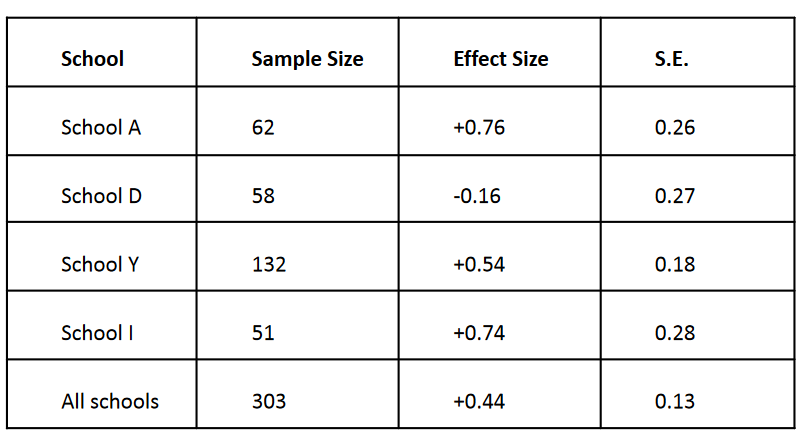The project
Eedi is an EdTech platform with more than 60,000 diagnostic maths questions. It reaches a user base of 15,500 monthly users through their school and tutoring platforms. The diagnostic questions are supplemented by AI and video recorded explanations to support learners requiring additional help,
such as addressing misconceptions. The platform provides learners on the premium model access to a live, one-to-one tutor, where a pupil can request help and receive support via a chat function on the platform.
The updated impact evaluation involved four schools and twelve classes of Key Stage 3 (KS3) students, with randomisation at class level. The Eedi programme was used in intervention classes for a specific topic of the White Rose KS3 scheme of work to supplement classroom teaching, with the
control classes not using the programme. Eedi is set by teachers for students to complete in lesson time or as an additional homework task.
The pilot combined an impact evaluation and a light touch implementation and process evaluation, using online teacher surveys and Eedi usage data. The design of the study allows for additional replications of the small-scale randomised controlled trials (RCTs) and the aggregation of the data
into a cumulative evidence base.
Key conclusions
During the short time of the delivery of the intervention for a Key Stage 3 topic in mathematics, students who used Eedi made significantly greater progress in this topic than students who did not. On average students using Eedi scored 17% higher in tests after using Eedi than in tests prior, compared to 6% for students not using Eedi. This shows using Eedi has a positive impact on improving students’ performance in maths tests used in this study.
Table 1: Eedi cumulative evidence base KS3 mathematics.
Eedi is an EdTech platform with more than 60,000 diagnostic maths questions. It reaches a user base of 15,500 monthly users through their school and tutoring platforms. The diagnostic questions are supplemented by AI and video recorded explanations to support learners requiring additional help,
such as addressing misconceptions. The platform provides learners on the premium model access to a live, one-to-one tutor, where a pupil can request help and receive support via a chat function on the platform.
The updated impact evaluation involved four schools and twelve classes of Key Stage 3 (KS3) students, with randomisation at class level. The Eedi programme was used in intervention classes for a specific topic of the White Rose KS3 scheme of work to supplement classroom teaching, with the
control classes not using the programme. Eedi is set by teachers for students to complete in lesson time or as an additional homework task.
The pilot combined an impact evaluation and a light touch implementation and process evaluation, using online teacher surveys and Eedi usage data. The design of the study allows for additional replications of the small-scale randomised controlled trials (RCTs) and the aggregation of the data
into a cumulative evidence base.
Key conclusions
During the short time of the delivery of the intervention for a Key Stage 3 topic in mathematics, students who used Eedi made significantly greater progress in this topic than students who did not. On average students using Eedi scored 17% higher in tests after using Eedi than in tests prior, compared to 6% for students not using Eedi. This shows using Eedi has a positive impact on improving students’ performance in maths tests used in this study.
Table 1: Eedi cumulative evidence base KS3 mathematics.



